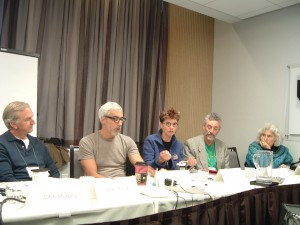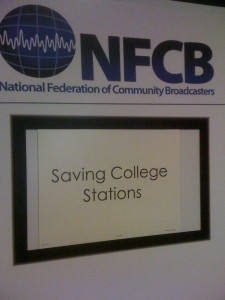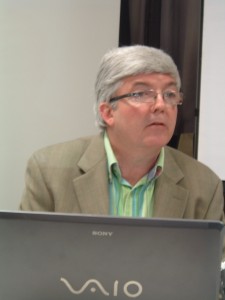Of the many fine panels at the recent National Federation of Community Broadcasters’ conference (you can find our complete coverage here), the one that was closest to my heart was the “Saving College Stations” session (mp3) on Saturday, June 4.
As was the case at a similar panel at SXSW this year, the participants included representatives from stations in crisis as well as from an organization, Public Radio Capital, that has been helping to facilitate college radio station sales.
Especially in light of last week’s shut-down of WRVU at Vanderbilt University, the discussion during this panel provides some important tips about how college radio stations can help prevent themselves from being sold off.
Ken Freedman, General Manager of community radio station WFMU opened the session by sharing how he managed to extricate WFMU from Upsala College following the school’s bankruptcy. He explained that he helped to set up two non-profits and by 1994, one of those non-profits purchased WFMU’s license, allowing it to become independent from the college. He described the strategy he used as “sell it and keep it,” explaining that a non-profit can convince a parent organization to sell a license, while at the same time giving that parent group access to the “service they had enjoyed” by allowing the station to remain on campus.
Freedman said that the pace of college radio station sales is “only going to accelerate” and argued that “student radio stations…have to take active” approaches toward ensuring their stations’ futures. He also said that he’d like to see an “adoption model,” in which older, more established stations are taking others under their wing to help usher them through crises. He also handed out his 10 tips for “How to Save Your College Radio Station.” They are:
1. Make the College a happy licensee so that they don’t want to sell the station.
2. With the College’s permission, incorporate in your state as a not-for-profit corporation for the purpose of keeping in touch with station/college alumni, eg: “Friends of WFMU.”
3. Populate the board of your Friends group with College staff and faculty, station people, lawyers and business fundraising people.
4. Develop a mailing list for your “Friends” group, and utilize them in positive ways that will not be a threat to the college
5. If the College is OK with…your Friends group raising money for the station, contact a (free) lawyer to apply…for 501-c-3 tax exempt status.
6. Identify a person or people from the station or Friends group who can cultivate a strong personal relationship with a key station decision-maker at the College.
7. Negotiate an “option to buy” or a “right of first refusal” contract so that IF the College decides to sell the station, the Friends group will be the first in line to buy it.
8. Start fundraising, either on behalf of the College licensee, or on behalf of the Friends group…
9. IF (and only if) your College is selling the station, negotiate a “sell it but keep it” contract with the College, under which the license is sold to the Friends group, but the College continues to enjoy all benefits of having an affiliated station.
10. Develop a contingency plan for how the station would remain intact (programming-wise) if the College were to suddenly change all the locks on the station doors.
In addition to Freedman’s advice, we also heard a bit about the situation at Rice University station KTRU from Duane Bradley, the General Manager of Pacifica community radio station KPFT in Houston. After the pending sale of KTRU was announced, KPFT wrote an “open letter” of support as a showing of solidarity with the station. Ultimately, KPFT offered to lease one of its HD channels to KTRU so that they could continue broadcasting over FM. He said, “we’re trying to find…the silver lining.”

NFCB Panel. Pictured: Marc Hand, Ken Freedman, Dorothy Kidd, Duane Bradley, and Elizabeth Robinson (Photo: J. Waits)
Dorothy Kidd, a Media Studies Professor at University of San Francisco also shared a bit about the situation at KUSF. She reminded everyone of the fact that, “KUSF has not been sold” since the deal has not yet been approved by the FCC. She praised “community and college stations,” arguing that they “have saved radio” and have shown “the continuing value of the airwaves.”
In speaking of the recent flurry of college radio station sales, Kidd said, “Now we have a crisis” in which valuable frequencies on the left hand side of the radio dial have been “seized upon.” She asked people to support the efforts of Save KUSF by writing to the FCC and she also suggested that people write to the FCC to initiate a public hearing about the “crisis of college radio.”
Then we heard from Marc Hand, Co-Managing Director of Public Radio Capital (PRC). Many in the audience were eager to hear from him, since Public Radio Capital has played a role in many college radio station sales. Public Radio Capital is 10% owner of Classical Public Radio Network, the entity which is attempting to buy KUSF. He explained that his radio career began at University of California, Santa Cruz’s college radio station KZSC and that Public Radio Capital has worked closely with college and community radio stations, including WFMU.
He pointed out that college radio station sales really didn’t happen much before the mid-1990s. Hand said that once colleges decide to sell their stations they generally want to make as much money as possible. He said that if Public Radio Capital didn’t exist, “almost all of these stations would be sold to religious broadcasters.” Hand also encouraged stations to have proactive discussions with their license holders in order to take a pre-emptive strike against any potential sale.
John Murphy, General Manager of WHUS (University of Connecticut, Storrs), also expressed his frustration over recent college radio station sales. In the most intense moment of the panel, he looked directly into the video camera taping the session and said,
“The tragedy in all of this is not even what’s happening, but how it is being done. To me as a manager at a college station, it is shameful, disrespectful and arrogant how the leaders of these institutions have treated the students that they’re supposed to be there to serve.
They make their decisions when they’re away in the summer time. They do it during winter breaks. Students don’t even participate in the arguments openly. I can say that whatever hassles we’re having with our school, they were in the open. We were able to debate and argue openly.
When a school administrator treats a student with less respect than a dog, to me they betray their institution. And if any administrator watches this video and you’re thinking about doing this to your students, I say take a second look at what you’re doing. Look in the mirror. These students that you’re serving deserve better. You should be open and own the power that you have and be held accountable for using it.”
Murphy encouraged college radio stations to engage with their universities, saying, “you need to have dialogues within your school now…so your school, however desperate it becomes, will always look to you as a resource to help them as well. The more you become conscious of your relationship and protect it, that’s one of the best ways to avoid a nasty situation before it even evolves.” He also suggested that college radio station managers form a committee in order to begin the work of sharing strategies about how to preserve college radio in general.
For the remainder of the panel, there was discussion amongst the panelists and questions from the audience were entertained. Kidd took the opportunity to confront Hand about the situation at KUSF. She pointed out to him, “you’re not only a broker…you’re part owner…of the new station” and asked him to help save KUSF. She added, “Sometimes people save the wrong things” and asked Hand to “help us say…there’s been some problems with this.” When pressed, Hand said that PRC “didn’t encourage” USF to sell KUSF. He said, “We were contacted by a broker they had hired to sell the station.”
As the session wrapped up, Freedman again reiterated his suggestion that college radio stations do all that they can in order to avoid a “drive-by shooting.” He encouraged stations to “set up a legal entity…that could hold the license” if needed and pointed out that it could be set up “ostensibly” to rally alumni support.
It was very clear from each panelist that college radio stations need to work hard in order to save themselves and that an open dialogue with one’s school is imperative in order to avoid what has happened at KTRU, KUSF, and now WRVU.
****
Here are a few more resources for stations looking to ensure their future:
9 Tips to Ensure College Radio’s Survival
Saving College Radio Panel at SXSW 2011 (Podcast)
The Mediageek’s Advice for College Stations, Part 1-Be True to Your School
The Mediageek’s Advice for College Stations, Part 2- No More Elitism, Recruit, Recruit, Recruit




